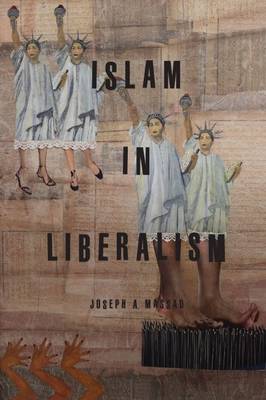
Stock image for illustration purposes only - book cover, edition or condition may vary.
Islam in Liberalism
Joseph Massad
FREE Delivery in Ireland
Description for Islam in Liberalism
Paperback. Num Pages: 404 pages, black & white illustrations. BIC Classification: HRH. Category: (P) Professional & Vocational. Dimension: 155 x 229 x 24. Weight in Grams: 604.
Product Details
Publisher
University Of Chicago Press
Place of Publication
, United States
Shipping Time
Usually ships in 4 to 8 working days
About Joseph Massad
Joseph A. Massad is professor of modern Arab politics and intellectual history in the Department of Middle Eastern, South Asian, and African Studies at Columbia University. He has written many books, including Desiring Arabs, also published by the University of Chicago Press.
Reviews for Islam in Liberalism
This indispensable compendium of rich, critical insights and readings is as learned as it is now necessary. Massad has recreated the scholarly and political context in which understanding of the relationships between Liberalism and Islam will be conducted.
Paul Gilroy King's College London A bold and insightful study of the historical and contemporary uses and misuses ... Read moreof rhetorics of democracy, women s rights and sexualities in their deployments in relation to Islam a rich important contribution to a growing body of such critical literature.
Leila Ahmed author of A Quiet Revolution: the Veil's Resurgence, from the Middle East to America Massad s contribution . . . is to posit Islam not as something in contention with liberalism as a claim to a particularist set of values but rather as formative of the liberal project itself. In this way Massad destabilizes a singularly European history of liberalism. An imagined Islam has always been present within this European project and any attempt to grapple with that project today must attend to the construction and elision of Islam at liberalism s core.
Kathleen Foody Marginalia Review of Books This indispensable compendium of rich, critical insights and readings is as learned as it is now necessary. Massad has recreated the scholarly and political context in which understanding of the relationships between Liberalism and Islam will be conducted.
Paul Gilroy King's College London A bold and insightful study of the historical and contemporary uses and misuses of rhetorics of democracy, women's rights and sexualities in their deployments in relation to Islam
a rich important contribution to a growing body of such critical literature.
Leila Ahmed author of A Quiet Revolution: the Veil's Resurgence, from the Middle East to America Massad's contribution . . . is to posit Islam not as something in contention with liberalism
as a claim to a particularist set of values
but rather as formative of the liberal project itself. In this way Massad destabilizes a singularly European history of liberalism. An imagined Islam has always been present within this European project and any attempt to grapple with that project today must attend to the construction and elision of Islam at liberalism's core.
Kathleen Foody Marginalia Review of Books Massad is an important intellectual voice. He commands attention internationally. He offers distinctive, compelling, and often brilliant critiques of positions that many regard as sacrosanct: most notably the human rights regime, NGOS, and international development organizations, and does not spare the therapeutic enterprises of psychoanalysis and transcultural tolerance.
Anne Norton University of Pennsylvania In recent years we have come to take seriously the idea that certain othering concepts such as 'the Orient' and 'Islam' have played a vital role in giving reality to 'the West.' The extraordinary value of Massad's new book is that he has shown, through a sustained analysis of a wide variety of historical and contemporary discourses, that 'Islam' has been more than a periphery-defining concept utilized merely to lend truth and solidity to the Christian West. Far more importantly, 'Islam' has been at work as a powerful agonistic imaginary indispensable for the self-definition of the West's own polity as essentiallyfree. This is a deeply considered work that is more than timely.
Tomoko Masuzawa University of Michigan This is a powerfully
often passionately
written text. . . . The only book that I can think of in comparison is Edward Said's Covering Islam
but Massad's book is far richer both in terms of the literature covered (much of which was of course not yet available when Said wrote his book) and the range of questions engaged.
Talal Asad Graduate Center, City University of New York Massad is an important intellectual voice. He commands attention internationally. He offers distinctive, compelling, and often brilliant critiques of positions that many regard as sacrosanct: most notably the human rights regime, NGOS, and international development organizations, and does not spare the therapeutic enterprises of psychoanalysis and transcultural tolerance.
Anne Norton University of Pennsylvania This is a powerfully often passionately
written text. . . . The only book that I can think of in comparison is Edward Said'sCovering Islam but Massad s book is far richer both in terms of the literature covered (much of which was of course not yet available when Said wrote his book) and the range of questions engaged.
Talal Asad Graduate Center, City University of New York Show Less

